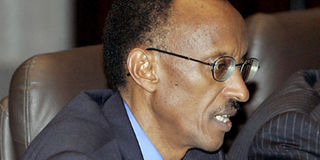Breaking News: KDF chopper crash kills five in West Pokot
Rwandan police arrest dozens of opposition protesters

Rwanda's President Paul Kagame. Photo/FILE
KIGALI, Thursday
Rwandan police arrested dozens of opposition protesters on Thursday, as President Paul Kagame presented his papers for re-election to the National Election Commission.
Earlier, Mr Charles Munyaneza, the Executive Secretary of Rwanda’s electoral body briefed the Nation on the nomination exercise, where all interested aspirants would be required to submit their papers. The exercise was set for June 24 and runs until July 2.
President Kagame is widely expected to secure a second seven-year term in the August 9 ballot. He has held de facto power since 1994 when his guerrilla force took power after ending massacres of some 800,000 ethnic Tutsis and moderate Hutus by Hutu authorities.
Opposition leader and presidential hopeful Victoire Ingabire, who is facing trial on charges of genocide denial and belonging to a terrorist organisation, said members of her United Democratic Forces party, which mainly represents Hutus, had been detained during a peaceful protest in Kigali.
“I think more than 100 were arrested,” she told Reuters by telephone. Police spokesman Eric Kayiranga said 20-30 people had been arrested across the capital for causing disorder and that another presidential hopeful, Mr Bernard Ntaganda, was taken in for questioning on Thursday morning.
Ms Ingabire’s party and the Democratic Green Party have called for the elections to be postponed to allow them to meet technical requirements to register. The two are the only parties that have not been able to register. A Reuters witness saw several Ingabire supporters arrested at the Justice Ministry as they unfurled party banners.
“They have to accept the registration of all political parties and that we can participate in the election,” Ms Ingabire said. Mr Ntaganda leads a faction of the opposition Social Party Imberakuri. In December last year he denied senate charges of peddling ethnic “divisionism” and genocide ideology.
“(Ntaganda) has not been charged yet, we will continue working on it. We are still collecting evidence,” Mr Kayiranga said by telephone. President Kagame has won praise for economic reforms and completely rebuilding state institutions since 1994 but international rights groups and the United States, a major donor and military ally, have expressed growing concerns about democratic freedoms ahead of the ballot.
“We’ve made very good progress, but there’s a long way to go. There’s still a lot to go ahead of us to be where we want to be,” Rwanda News Agency quoted Mr Kagame as saying after handing in his papers to the electoral body. About five aspirants including the embattled Ingabire have openly declared their intentions to run for presidency in the polls.
Three of the contestants including Mr Kagame and two top parliamentarian have been official endorsed by their political organisations. Dr Jean Damascene Ntawukuriryayo, the Deputy Speaker of Parliament will represent Social Democratic Party (PSD) and Mr Prosper Higiro, current Senate Vice President of Rwanda’s bicameral parliament, will represent Liberal Party (PL).
Rwanda’s Electoral Law stipulates that all persons with intentions to vie for the presidency should present their candidature 35 days before the election date. Prof Chryslogue Karangwa, the chairman of the National Electoral Commission (NEC), while announcing the provisional voters’ list on Thursday, told reporters that conditions to be observed by prospective candidates include being a citizen of Rwanda and having no other citizenship.
According to NEC, all candidates should have roots in Rwanda or at least one of the parents of a candidate should be Rwandan and should have record of integrity within and outside the country. President Kagame won the presidency in 2003 after securing 95 per cent of the vote.
The main element of suspense in this year’s presidential election, which is the second in Rwanda’s post-genocide era, is whether the three radical opposition parties including, Social Party-Imberakuri (PS-Imberakuri), the Green Party (DGP) and UDF will be allowed to field their own presidential candidates.
Ms Ingabire is in court facing charges on terrorism, genocide links and ethnic divisionism. Officials said that she cannot be received by the National Electoral Commission (NEC) for nomination unless she is cleared by court. Prosecutor General Martin Ngoga, said that Ms Ingabire’s case shouldn’t be politicised after the aspirant asked for a speedy trial to be able to meet the 2nd July nomination deadline.
Addressing the press on Tuesday, Mr Ngoga said that Ms Ingabire should not demand a speedy trial because investigations into her case highly depend on the level of cooperation in countries in which Ms Ingabire committed some these crimes like financially facilitating rebels hostile to Rwanda.
Mr Ngoga pointed out a number of countries including Holland, United States, Belgium, Switzerland, DR Congo and Burundi of which the prosecution has demanded for some information that could be useful to the investigations.




